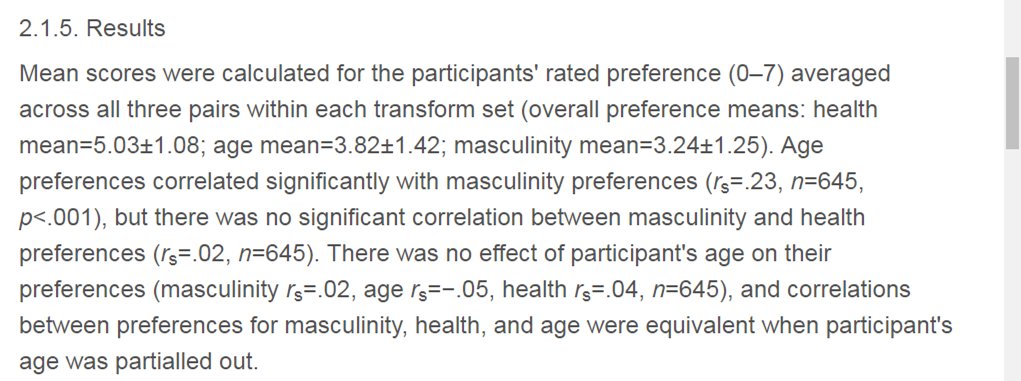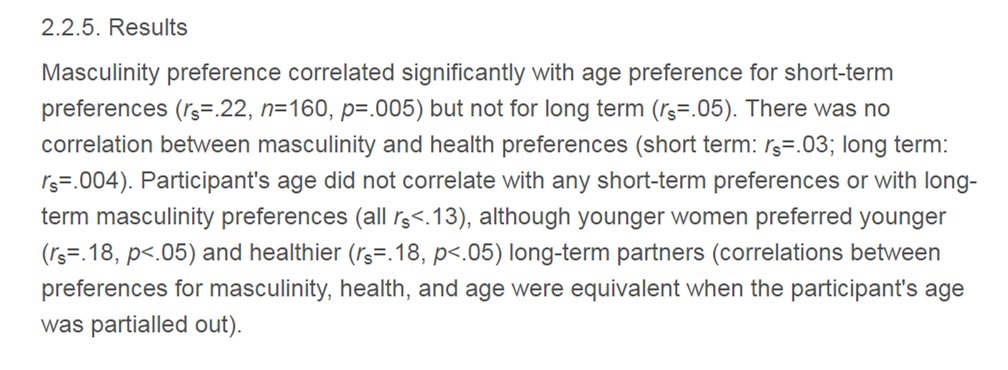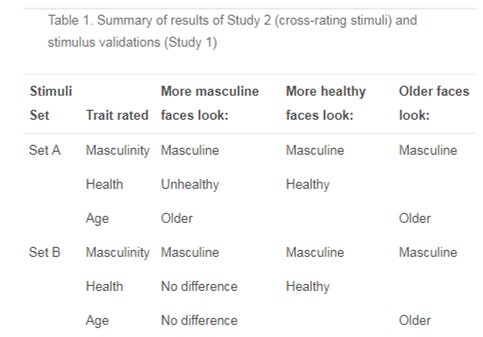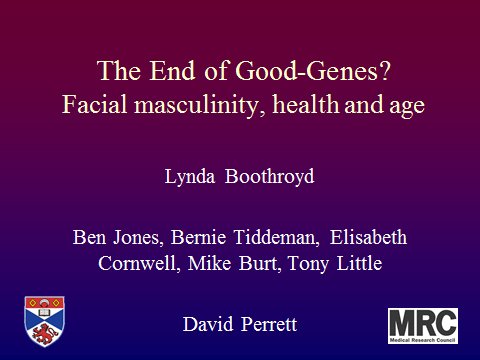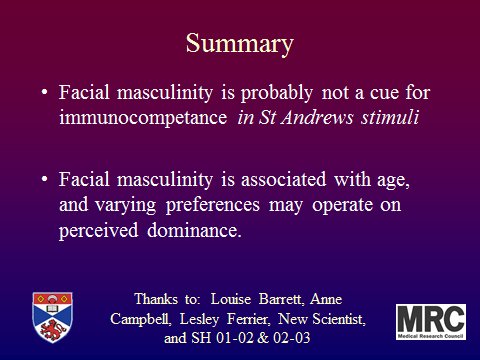It’s time for my facial masculinity rant – or “how frustrating it was to be right all along and still wrong in ways I hadn’t expected”.
1/
1/
In 2002, as a baby PhD student I gathered data on women’s preferences for masculinity, health and age in men’s faces, expecting to get an overall ‘preference for quality’. It didn’t turn out as planned…
2/
2/
At this time everyone assumed that masculinity, via testosterone (T), indicated underlying immunity because T is immunosuppressive. This was fairly well evidenced in birds and had been put forward to explain cyclic variation in women’s preferences for masculinity.
3/
3/
I had some questions about this approach, but I generally accepted that women preferred masculine faces when fertile because that’s when healthy genes matter.
4/
4/
So it came as a shock when my data showed that women’s preferences for masculinity were unrelated to their preferences for an even better indicator of health … how healthy the face actually looked!
5/
5/
I talked it through with my supervisor and labmates (particularly @Ben_C_J); we remained surprised. So I tried to replicate it. New images, new sample, still no link. I got the stimuli rated just to check; masculinised faces didn’t *look* healthy either.
6/
6/
Publishing this took years; 2 editors, 6 reviewers, and help editing the resulting mess from @Ben_C_J when I was ready to give up. But I got it out there.
I also presented it (precocious smartarse title: ‘The End of Good Genes?’) at @HumBehEvoSoc 2003.
https://www.sciencedirect.com/science/article/pii/S1090513805000024
7/">https://www.sciencedirect.com/science/a...
I also presented it (precocious smartarse title: ‘The End of Good Genes?’) at @HumBehEvoSoc 2003.
https://www.sciencedirect.com/science/article/pii/S1090513805000024
7/">https://www.sciencedirect.com/science/a...
I thought this would make an impact; it was important! It didn’t. Another paper from our lab, showed that preferences for health changed across the cycle in independent of masculinity; very well cited paper but not for the immunocompetence implications.
https://royalsocietypublishing.org/doi/10.1098/rspb.2004.2962
8/">https://royalsocietypublishing.org/doi/10.10...
https://royalsocietypublishing.org/doi/10.1098/rspb.2004.2962
8/">https://royalsocietypublishing.org/doi/10.10...
I ran another study looking at mate-relevant attributions; two factors emerged: overall positive traits and dominance (yes, same as Todorov). Healthy faces looked positive, masculine faces looked dominant; still no link between the two.
https://www.sciencedirect.com/science/article/pii/S0191886907000955
9/">https://www.sciencedirect.com/science/a...
https://www.sciencedirect.com/science/article/pii/S0191886907000955
9/">https://www.sciencedirect.com/science/a...
I therefore proposed that masculinity was preferred by fertile women/women seeking a short term partner because of the benefits of dominance to future offspring (via the Sexy Son Hypothesis) rather than health.
10/
10/
And then I dug deeper, with more new samples, showing that masculinity preferences weren’t related to other purported indices of health: averageness and symmetry, and masculinity preferences weren’t notably different in more or less symmetric faces.
https://akademiai.com/doi/abs/10.1556/JEP.7.2009.1.7
11/">https://akademiai.com/doi/abs/1...
https://akademiai.com/doi/abs/10.1556/JEP.7.2009.1.7
11/">https://akademiai.com/doi/abs/1...
I presented this at multiple conferences; a leading proponent of the immunocompetence approach told me one two occasions how interesting it was but he’s never cited me on it. By this point I was getting really, really annoyed.
12/
12/
More papers followed; we found evidence for a link between masculinity and actual future health was weak and a systematic review of the literature showed that almost all evidence for a T-health link was also weak and sometimes contradictory.
https://journals.sagepub.com/doi/10.1177/147470491301100508
13/">https://journals.sagepub.com/doi/10.11...
https://journals.sagepub.com/doi/10.1177/147470491301100508
13/">https://journals.sagepub.com/doi/10.11...
Critically, we found that masculinity was – if anything - *bad* for offspring survival in 2 small-scale societies. (That paper took years, many revisions, maternity leave, many editors, a 6-page stats rebuttal, and I hated it by the time it came out.)
https://journals.plos.org/plosone/article?id=10.1371/journal.pone.0169181
14/">https://journals.plos.org/plosone/a...
https://journals.plos.org/plosone/article?id=10.1371/journal.pone.0169181
14/">https://journals.plos.org/plosone/a...
I teamed up with @isabelmscott to write a review on all this and restated the core issue – evidence for masculinity indicating underlying health was weak (directly or via preferences). We again suggested that dominance/Sexy-sons might be more fruitful.
https://academic.oup.com/beheco/article/24/3/579/192103
15/">https://academic.oup.com/beheco/ar...
https://academic.oup.com/beheco/article/24/3/579/192103
15/">https://academic.oup.com/beheco/ar...
Because we crucially still believed that masculinity preferences varied across this cycle in a way which needed explanation.
16/
16/
Fast forward to 2018 and a cascade of big, high quality studies found no effect of menstrual cycle/hormones on masculinity preferences. Suddenly everyone was talking about masculinity/good genes being dead.
http://dx.doi.org/10.1016/j.tics.2018.10.008
17/">https://dx.doi.org/10.1016/j...
http://dx.doi.org/10.1016/j.tics.2018.10.008
17/">https://dx.doi.org/10.1016/j...
I was right all along! But mainly because the phenomenon we’d all been trying to understand … maybe didn’t even exist to start with.
18/
18/
Some days I honestly feel like I’ve been gaslit by science itself…
19/
19/
(This rant was brought to you by this really-good-actually paper…)
https://www.pnas.org/content/116/5/1633">https://www.pnas.org/content/1...
20/20
https://www.pnas.org/content/116/5/1633">https://www.pnas.org/content/1...
20/20
Haha, got curious and looked through files, and voila! My opening and closing slides at @HumBehEvoSoc 2003 in Nebraska. I still remember @anthonyclittle& #39;s face when he sat through my dry run. "That& #39;s a really scary title, Lynda."
(I should probably belatedly apologise to the room full of people who had to sit through slides with a colour scheme inspired by my lava lamp...)

 Read on Twitter
Read on Twitter